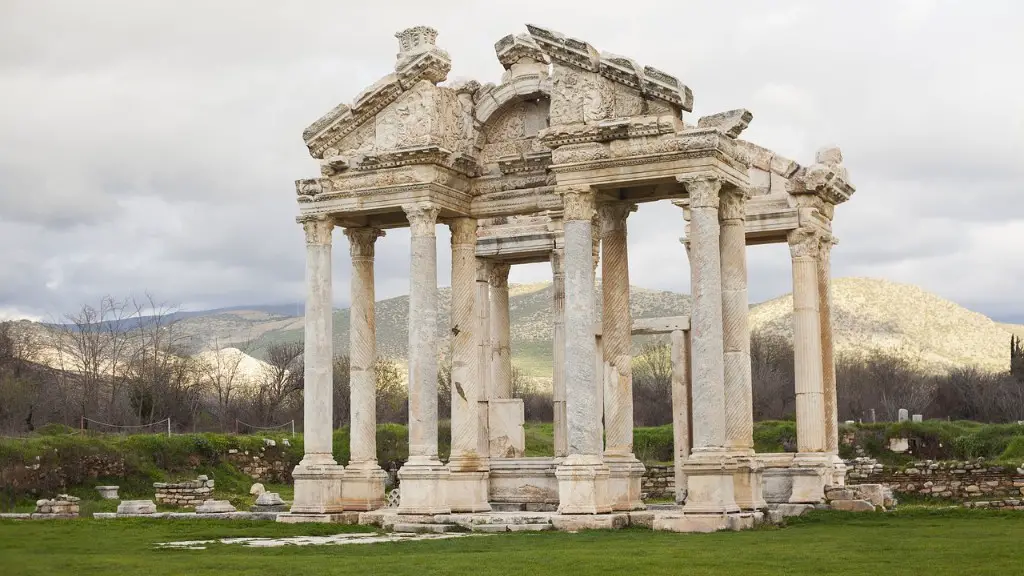Ancient Rome was a society with rigid gender roles; women were systematically discriminated and their rights were limited. Women were legally subordinated to men – their fathers in their families, and their husbands when married. However, despite the patriarchal structure, women played an important role in Roman society. One of their main jobs was to be a mother, a wife and a caregiver. They were also expected to be caretakers of the home, providing comfort and security.
Women in ancient Rome were responsible for the everyday running of the home and family life. They were expected to be devoted to their husbands and take care of their children’s physical and mental needs, including food, clothing, and education. In addition, women were also expected to run the household, supervise the servants, prepare meals, do the laundry, and manage the family’s finances. As a wife and mother, women had to maintain the family’s honor and uphold Rome’s traditional values.
Aside from their domestic duties, women were also expected to take part in religious festivals and ceremonies. They participated in domestic religious rituals and observed certain holidays, such as the Matronalia, which was dedicated to Juno, the goddess of childbirth and marriage. On that day, women were excused from their household duties and could even attend public ceremonies. Roman women also celebrated the Vinalia, a festival created to honor the goddess of wine, Venus.
Women of higher classes had more freedom than other women. They were not restricted to their households and could attend public events and even participate in political life. Wealthy women could own businesses and even become priests. While they did not have the same civil rights as men, they had more status and power than most women in other ancient civilizations. Women during this time period also earned money by spinning and weaving fabric, as well as sewing and dyeing clothing.
Women’s rights in ancient Rome were considerably different from the rights of women in modern times; women had limited power and were in many ways were treated as second-class citizens. Despite this, women were an integral part of Roman society and played an important role in the running of its households and in religious life. Without the efforts of the women of ancient Rome, the entire structure of the Roman civilization would have been threatened.
Affect of Social Hierarchy
Social hierarchy played a decisive role in the lives of ancient Roman women. Elite women in Rome had a greater degree of freedom than those lower in social ranking. They could inherit, buy and own property, have some power over their households, and purchase and enjoy luxury goods. Lower class women had little or no legal rights and were bound to their households and the needs of their husbands and children. These women usually worked in the home, farmed the land, or depended on mercantile trade.
Although there were differences between the rights and status of upper and lower class women, there were also some similarities: both had to serve their husbands and obey their fathers and they both had to accept their subordinated status in the Roman society. Roman women from both classes were expected to be loyal and dedicated to their families and their people.
Women were in many ways seen as the guardians of morality, preserving the ethical and social norms decided by the men. If a woman was unfaithful, immoral, or irresponsible, it was seen as a discredit to her family and in some cases it could cause her to be ostracized by the society. That being said, Roman society also saw women as essential to the functioning of the family and to the reproductive capacity of the species as a whole.
Relationship with Slavery
Ancient Rome was an imperial power and women of higher classes had extensive power over their households, which often included slaves. The relationship between female masters and their slaves was an especially complicated one, as the slaves were often dependent on their owners for their very survival. Slave women and their children were also subject to mistreatment and exploitation, with no legal protection whatsoever.
Women could act as confidants, surrogate mothers, or even close friends to their slaves, but at the same time, they held the authority and power over them. Roman law also gave female masters the right to punish slaves for any mischief or misconduct. This power wielded by women was both a privilege and an onerous responsibility, as it was a highly visible form of control and legitimation of Roman social hierarchy.
Slave women were often captives taken in war or people who had lost their freedom due to poverty. They did not have the same legal rights as other citizens and were subjected to the whim and authority of their masters. Roman women of higher classes were also able to buy and own slaves for their households and for their personal leisure, using them for tasks such as running errands, cleaning and cooking. The use of slaves was one of the most visible symbols of wealth and social status in ancient Rome.
Status of Women in Ancient Rome
The status of women in ancient Rome was determined by their class. Roman women of elite class, who belonged to the upper classes, were able to own property, inherit, or buy goods. Lower-class women were, however, limited and were largely restricted to domestic duties. Women were also under the control of male guardians, such as their husband, father, or brother, who was responsible for managing their rights and legal affairs.
It is worth noting that despite the substantial differences between the status of various women in ancient Rome, they all faced severe restrictions in terms of their rights when compared to men. Women were forbidden to inherit the throne, become senators, or hold important public positions. Women could not commit a crime or be held accountable in court, and they were not allowed to participate in political life or speak in the Senate.
Women could not be awarded the honors given to men either; they could not join the army, be awarded prestigious positions, or be given the right to vote. While men had the right to divorce their wives for any reason, women only had the right to ask for a divorce if their husband was guilty of a serious crime.
Literary Works Featuring Ancient Roman Women
The lives of ancient Roman women were not widely documented in literature or other forms of art. Historical records provide us with limited information about the roles of women in ancient Rome, so it is difficult to know how the lives of the average woman may have looked like on a day-to-day basis. Despite this, many works of literature have featured the stories of Roman women, such as the famous plays by Plautus, Ovid’s “Metamorphoses,” and Seneca’s “Troades,” which provide us with an idea of the roles and responsibilities of women in that age.
A more recent example is Robert Graves’s “I, Claudius,” which tells the story of an emperor who was overshadowed by three powerful women: his mother Livia, his wife Seianus, and his daughter Julia. The story provides an interesting perspective on the power dynamics in Roman society, one in which the women play a considerable role.
The feminist scholar Mary R. Lefkowitz has also written extensively on the subject of ancient Roman women and has argued that, although their status in society was limited, there are instances of female power and creativity in Roman literature. She notes that, despite the constraints imposed on them, many Roman women were able to challenge the traditional gender roles by writing, holding political office and even taking on military leadership roles.
Impact of Christianity
Christianity’s impact on the rights of women in Ancient Rome is an especially significant one. Following the spread of the religion throughout the Roman Empire, women’s status improved significantly. Christianity was much less discriminatory towards women than other religions during that time, and women were allowed to attend religious classes and ceremonies. This meant that they could gain knowledge and education, which was one of the main factors contributing to the social change and the increasing rights of women.
Christianity also introduced the concept of marriage as a sacrament that was to be based on mutual respect and trust, as opposed to the traditional Roman view of it as a power dynamic. Although it was still ultimately a male-dominated institution, Christianity set the foundation for transforming marriage into a loving, equal partnership between a man and a woman. This allowed women to form their own independent identity, as opposed to being simply domestic workers or subordinates.
Christianity also valued the contributions made by women, and the importance of maternal love in raising and educating children. This had a huge impact on the lives of Roman women, in that it made childcare and housekeeping more valued, as opposed to being despised as a tedious chore. Christianity’s emphasis on the essential role that mothers play in forming a child’s character was also incredibly influential in Roman culture.
Women’s Rights in Modern Times
It is clear that the rights and roles of women in ancient Rome have changed drastically since then. Women in the 21st century have a much more active role in society, with the right to vote, own property, and serve in the armed forces. While there is still a considerable amount of gender inequality, the legal and social landscape has changed immensely since ancient Rome, and we are now more aware than ever of the importance of equality between men and women.
It is important to remember that while women have come a long way in terms of achieving equal rights and opportunities, there is still much progress to be made in terms of workplace equality, gender-based discrimination, and social justice. The advancements women have achieved throughout human history are a testament to the strength and resilience of the female sex, but there is still much more to be done in order to ensure that all women have the same rights, freedoms, and respect as their male counterparts.





